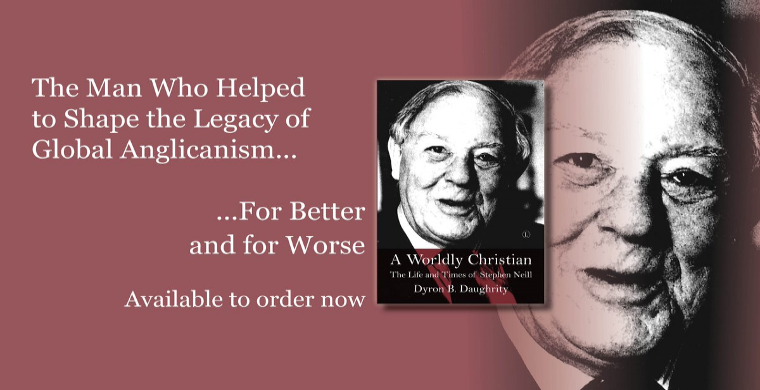A WORLDLY CHRISTIAN
The life and times of Stephen Neill
By Dyron B. Daughrity
401pp Lutterworth, 401pp, 2021 £25.00
Reviewed by Chris Sugden
CEN
August 5, 2021
Clear themes stand out from what will become the definitive volume and source for Bishop Stephen Neill's life.
The author meticulously documents his life, including the years 1948-62 which were not covered in the published edition of his autobiography, God's Apprentice (p. 222). The material covering his time from leaving the WCC, which he thought had been taken over by North American corporate culture (p 221) and his professorship in Hamburg, has never been published before. His work in those years was 'a hodge podge' of writing, lecturing, and doing reports and surveys.
After the second world war Bishop Neill led a large number of successful university missions in the UK, Europe and the United States. He completed a major survey of theological education in Africa which led to him being General Editor of the series "World Christian Books" which totalled a million copies in 60 titles and 40 languages.
Daughrity lists and summarises Neill's own major works, over 70 books, and myriad articles, all of which he wrote in longhand.
He carefully records first hand testimony of the 'fetish' that Bishop Neill had for befriending young single men who were considering ordination, inviting them for pastoral chats which ended with him beating their backsides, sometimes bare, as an expression of physical discipline for confessed 'sin'. This continued even at the age of 78 while at Wycliffe Hall. Daughrity judges that while this gave Neill some arousal there is no evidence that he was actively homosexual. He deplored the 'distortion' of the word 'gay' (p342). However, such treatment of young clergymen was wrong and 'churches far and wide...are still reeling from the consequences of exceedingly inappropriate actions by some clergy'. (p 369).
It was for such abuse that he was asked to resign after six years as Bishop of Tinnevelly South India (1939-45). While he greatly admired the first Indian bishop, Bishop Azariah of Dornakal (1974-1945) Daughrity gives no evidence of close relationships with Indian or African Christians. Most of his lecturing, apart from his 4 years in Nairobi, was to gatherings of missionaries and North American and European Universities. Professor Jesse Mugambi, a contemporary of Neill's in his time at Nairobi University and an eventual successor in his professorial post (1969-73) gives a candid assessment of Neill's time in Africa, that he was not interested in African religion or culture.
Canon Vinay Samuel, who knew Bishop Neill both in India, Cambridge and Oxford notes that Daughrity's description of him as a "worldly Christian" highlights his global involvement in Asia, Africa, Europe and North America. He writes: "There was a particularity to his relation to other cultures. He was fluent in several languages, engaged with the Tamil culture of South India seriously and mastered the language. In my conversation with him I noted that he was careful not to claim a deep understanding of other cultures. As one part of a confident colonial British culture he recognised that he could not claim to be a multicultural world Christian but an English Christian who respected other cultures."
In June 1944 Neill resigned the bishopric of Tinnevelly, eventually effective in 1945. Daughrity does not mention that in November 1944 Neill was offered the mastership of St Peter's Hall Oxford, but by February 1945 had declined it. This is recorded in St Peter's Oxford - From Hall to College, by EHF Smith, page 165. St Peter's had been founded in 1928/9 as an evangelical foundation by Bishop Francis Chavasse of Liverpool and his son Christopher.
END














